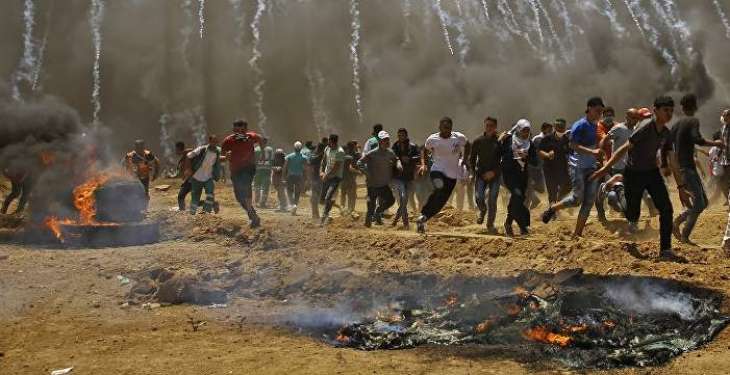The crisis in the Gaza Strip, where tensions escalated over the past weekend, cannot be resolved by military means and requires measures that would improve the lives of Palestinians there from the economic and humanitarian perspectives, experts told Sputnik
MOSCOW (Pakistan Point News / Sputnik - 08th May, 2019) The crisis in the Gaza Strip, where tensions escalated over the past weekend, cannot be resolved by military means and requires measures that would improve the lives of Palestinians there from the economic and humanitarian perspectives, experts told Sputnik.Tensions between Israel and Palestinians from the Gaza Strip flared up on Saturday, when hundreds of rockets were fired toward Israel from the Palestinian enclave, prompting the Israeli military to retaliate. The violence has claimed the lives of at least 25 Palestinians and four Israelis. A ceasefire went into force early on Monday.
The exchange of fire has broken the Egypt-mediated truce, which lasted more than a month and stipulated reduction in bombardment in exchange for easing Gaza's blockade by Israel.
ECONOMIC AND HUMANITARIAN MEASURES
Over the past years there has been a negative correlation between the deterioration of the economic situation in Gaza and escalations in the region, Moran Stern, a lecturer at Georgetown University's program for Jewish civilization, told Sputnik.
"In the past, say, five or six years, there is a negative relationship between the economic situation in Gaza and the likelihood of conflicts," Stern said.
According to expert, the ceasefire should be sustained by non-military strategy to "compensate for it."
"We have to understand the Gaza issue is not just black and white, there are a lot of shades of grey in the middle. Now the task of Israel - and Israel should actually take the initiative, because Israel is always the first to suffer - is a strategy in non-military dimension," Stern said.
Dwelling on possible long-term strategy, Stern named tackling the unemployment in Gaza, where two of three young persons are unemployed, according to World Bank data.
"In the longer term, the solution to Gaza [crisis] is also to invest in the infrastructure, to deal with the high unemployment, especially among the youth, for example, by providing public works. Specifically, Israel could [issue] more work permits that allow Gazans to leave the Gaza Strip to work in Israel and come back home to Gaza in the end of the day," the expert said.
He also highlighted the need to address humanitarian problems in the area, including the dire water crisis that may make Gaza uninhabitable by 2020, according to the United Nations.
"[Israel can also] allow medical treatment for Gazans in Israel," he added.
Stern added that one of the key conditions for such measures would be reciprocal steps by Hamas, which controls Gaza.
"Hamas should know that they have to pay duely for all these goodies that they might expect to have," he pointed out.
The expert, however, stressed that it was doubtful whether Israeli Prime Minister Benjamin Netanyahu's government would be taking some long-term measures, especially in the light of the "deal of the century" expected to be announced by the administration of US President Donald Trump.
"The price is very high for Israel politically. And I do not see Israel actually taking the initiative on it. I think Israel is still waiting to see what Trump's peace plan would be," Stern said.
According to the expert, economic and humanitarian action in regard to Gaza would be likely limited to previously agreed steps such as allowing money flows via Qatar, expanding the fishing zone for Gaza residents, increase in the number of humanitarian trucks allowed to enter into Gaza, as well as fuel supplies by Qatar.
"So, basically, this round of fighting will bring us to what has already been agreed by the sides ... None of these are structural solutions," Stern stressed.
Commenting on the recent escalation in Gaza, Zaha Hassan, a human rights lawyer and visiting fellow at the Carnegie Endowment for International Peace, also pointed out the lack of attention to the fate of common people in Gaza.
"Everyone is using the situation in Gaza for their own political advantage here but the biggest losers are � and have always been � Palestinians," Hassan told Sputnik.
STRONG NEED FOR INTERNATIONAL EFFORTS
Hassan stressed the need for not only humanitarian, but also political steps to finally put an end to repeating escalations in Gaza Strip, noting that the process would have to involve the international actors.
"Until the blockade and siege end � and there is a political solution � there will not be a way to ensure a lasting end to violence. Gaza is not just a humanitarian issue; it is part of a political conflict that must be resolved with the help of the international community," the human rights lawyer said.
She stressed that the international actors should urge deliveries of supplies and freedom of people in Gaza, but, similarly to Stern, highlighted the need for longer-term actions.
"The international community could begin by demanding an end to the siege and blockade and by calling on Israel and Egypt to allow supplies to be brought in and for people to have freedom of movement in and out of Gaza. More long term solutions are needed beyond these measures," Hassan said.
Stern also highlighted the need for cessation of hostilities in the region and diplomatic approaches in addressing the conflict, which could be, however, complicated by differences between the government in Ramallah and the Hamas government in Gaza.
While admitting the important role played by international and regional actors, including Egypt that proved to be "a very efficient mediator in every instant of escalations," the expert stressed that the crisis in Gaza could not be resolved without the Palestinian authorities in Ramallah.




